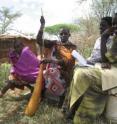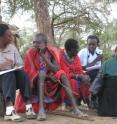Nomad people baffle with good health in spite of malnourishment
(Jena/Germany) The human body is a true miracle. For that Nadja Knoll found new proof in the nomad people of the Maasai in Kenya in Eastern Africa. For her thesis the nutritionist from the Friedrich Schiller University Jena (Germany) analyzed the diet of a nomadic tribe in the Kajiado District. The surprising results of the field study show that the Maasai are in a good health status in spite of a one-sided and poor diet. The blood investigations showed that there is a high content of healthy omega-3 fatty acids in their erythrocyte membranes, the cell walls of the red blood cells, even though they are not ingested. "We were surprised by these results. They are proof for the enormous adaptability of the human organism", says Prof. Dr. Gerhard Jahreis of the Department of Nutritional Physiology, under whose guidance the study was conducted.
Yet another finding was the outcome of the fieldwork in Africa. Nadja Knoll´s study shows that the traditional story patterns about the Maasai diet are wrong. Travelers in Africa like Gustav Adolf Fischer (1848-1886) and the Englishman Joseph Thomson (1858-1895) spread the image of the blood thirsty Maasai. According to their reports the herdsmen consume mainly meat, milk and blood. A particularly high percentage of fermented milk – a kind of yoghurt – was also said to be part of their diet. Nadja Knoll´s findings paint a very different picture. The scientist of Jena University discovered that the Maasai have strongly sweetened milk tea for breakfast. Some Maasai eat a kind of "porridge" in the morning, a liquid mixture of cormeal, water, some milk and sugar.
For lunch there will be milk and "Ugali", a kind of polenta being made from cormeal and water. "Dinner is similar to lunch", says Knoll who points out that she did her field study at the end of the dry season. There may be slightly different results in the – remarkably shorter – rainy season, because then the Maasai livestock produces more milk. This milk will then ferment in calabashes. The outcome of the fermenting process will be a yoghurt-like drink that might have pro-biotic benefits.
It is clear though that meat features only rarely on the Maasai menu. The main part - more than 50 percent - consists of vegetarian food. The preferred meat is that of sheep and goats, whereas the meat of traditional Zebu cattle is only rarely eaten. "A cow will only be slaughtered for ritual festivities by the Maasai", says Knoll.
Knoll conducted her study together with colleagues of the Jomo Kenyatta University of Agriculture and Technology of Juja/Nairobi (Kenia). Before the fieldwork could begin an ethics commission had to give their approval. Given the high HIV rate in the country especially the planned blood tests were questioned.
The achievements of the Jena nutritionists will be published in an international, renowned scientific journal.
Source: Friedrich-Schiller-Universität Jena
Other sources
- Nomads in Surprisingly Good Health Despite Poor Dietfrom Live ScienceTue, 18 May 2010, 14:30:38 UTC
- Nomadic people's good health baffle scientistsfrom Science DailyTue, 18 May 2010, 4:31:49 UTC
- Nomad people baffle with good health in spite of malnourishmentfrom PhysorgMon, 17 May 2010, 15:32:33 UTC

